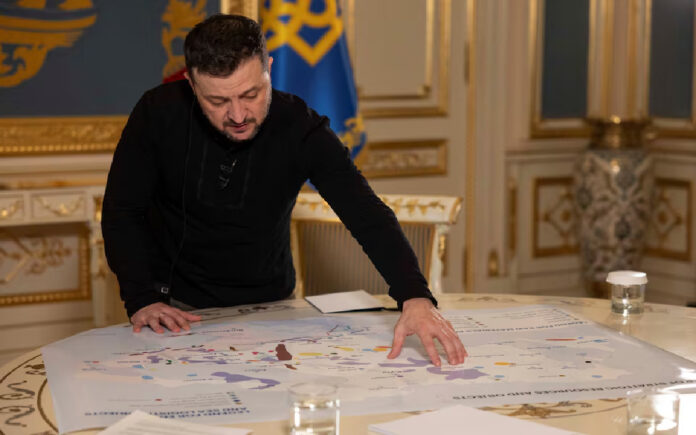Kyiv: Ukrainian President Volodymyr Zelenskiy, during an interview with Reuters on Friday, examined a once-classified map detailing Ukraine’s vast deposits of rare earths and other critical minerals. This move is part of his broader effort to appeal to former U.S. President Donald Trump’s well-known inclination toward deal-making.
Trump, whose administration has been pushing for a swift resolution to Ukraine’s ongoing war with Russia, stated on Monday that he wanted Ukraine to supply rare earths and other minerals to the United States in exchange for financial support for its war effort.
“If we are talking about a deal, then let’s do a deal. We are only for it,” Zelenskiy said, underlining Ukraine’s urgent need for security guarantees from its allies as part of any agreement.
Ukraine initially proposed opening its critical mineral resources to allied investment last autumn, presenting it as part of a “victory plan” aimed at strengthening its position in negotiations and compelling Moscow to engage in talks. According to Zelenskiy, less than 20% of Ukraine’s mineral resources—including about half of its rare earth deposits—are currently under Russian occupation.
Rare earth minerals are crucial for producing high-performance magnets, electric motors, and consumer electronics. Zelenskiy warned that Moscow could leverage these resources by offering them to North Korea and Iran, both of whom are adversaries of the United States. “We need to stop Putin and protect what we have—a very rich Dnipro region, central Ukraine,” he stated.
Ukrainian President Volodymyr Zelenskiy pored over a once-classified map of vast deposits of rare earths and other critical minerals during an interview with @Reuters, part of a push to appeal to Donald Trump's penchant for a deal https://t.co/1kQnfqx2u5 pic.twitter.com/XxOAwUNb3n
— Reuters (@Reuters) February 7, 2025
Mineral Wealth and Strategic Interests
For months, Russian forces have been making gains in eastern Ukraine, throwing significant resources into an unrelenting offensive while Kyiv struggles with manpower shortages and uncertainties over future arms supplies from international allies. During the interview, Zelenskiy unfurled a detailed map in his heavily secured office in Kyiv, highlighting numerous mineral deposits. A broad strip of land in the east, marked as containing rare earths, showed that around half of these deposits currently lie in Russian-controlled territory.
He emphasized that Ukraine holds Europe’s largest reserves of titanium—vital for the aviation and space industries—as well as uranium, which is essential for nuclear energy and weaponry. Many of these titanium deposits are situated in northwestern Ukraine, far from the current frontlines.
With a strategic pivot in foreign policy, Ukraine has been adjusting its diplomatic approach to align with the transactional perspective championed by Trump, Kyiv’s most crucial ally. However, Zelenskiy clarified that Ukraine is not proposing to simply “give away” its resources but rather to establish a mutually beneficial partnership for joint development. “The Americans helped the most, and therefore the Americans should earn the most. And they should have this priority, and they will. I would also like to talk about this with President Trump,” he added.
Zelenskiy noted that Russia possesses detailed knowledge of Ukraine’s critical mineral wealth, stemming from Soviet-era geological surveys that were transferred to Moscow when Kyiv gained independence in 1991.
Energy Partnerships and LNG Storage Plans
Beyond critical minerals, Zelenskiy disclosed that Kyiv and the White House have been discussing potential U.S. investments in Ukraine’s vast underground gas storage facilities. The plan includes storing liquefied natural gas (LNG) from the U.S. to establish Ukraine as a key energy hub for Europe.
“I know that the Trump administration is very interested in it… We’re ready and willing to have contracts for LNG supplies to Ukraine. And of course, we will be a hub for the whole of Europe,” he said.
Seeking a Meeting with Trump Before U.S.-Russia Talks
The interview took place just days before the Munich Security Conference, scheduled for February 14-16, where officials from numerous Western nations will gather at a critical juncture in the nearly three-year-long war.
Zelenskiy confirmed his attendance at the forum, where Keith Kellogg, Trump’s special envoy for Russia and Ukraine, is also expected to participate. The Ukrainian leader stressed the necessity of meeting Trump in person before any potential U.S.-Russia negotiations. “Otherwise, it will look like a dialogue about Ukraine without Ukraine,” he cautioned.
Trump announced on Friday that he expected to speak with Zelenskiy the following week. The Ukrainian president emphasized that his priority would be to secure commitments for long-term security guarantees to prevent future Russian aggression.
Also Read | East Congo Conflict Worsens as UN Calls for Urgent Action
Zelenskiy also highlighted the need for the West to establish a coherent strategy before engaging in talks with Moscow. He acknowledged ongoing discussions between his team and key Trump administration figures, including Kellogg and National Security Advisor Michael Waltz. “Every day we have contacts. We talk about general things, but the specifics will come a little later,” he stated.
Meanwhile, Trump’s push for peace comes as Russian forces advance toward Pokrovsk, a major Ukrainian logistics hub.
Escalation on the Battlefield
Zelenskiy confirmed for the first time that Ukrainian forces had launched a new offensive on Thursday, making an advance of 2.5 kilometers (1.5 miles) into Russia’s Kursk region. Russia had earlier reported a Ukrainian attack in the area but claimed it was repelled.
He also revealed that thousands of North Korean troops fighting alongside Russian forces had resumed active combat against Ukraine’s military in the Kursk region after a weeks-long pause.
Also Read | Sweden Moves to Ban Certain Weapons After School Attack
To address manpower shortages, the Ukrainian government plans to launch a recruitment initiative next week, offering lucrative contracts to attract young men aged 18-24—below the draft age—into the armed forces. However, Zelenskiy declined to disclose specific recruitment targets.



